Google’s E-E-A-T framework is how the search engine decides which websites to trust and show to users. E-E-A-T stands for Experience, Expertise, Authoritativeness, and Trustworthiness—four qualities that Google looks for when deciding if your content is worth ranking.
Think of it like this: if you needed medical advice, would you trust someone who actually lived through a health condition (Experience), has medical training (Expertise), is recognized by other doctors (Authoritativeness), and runs a legitimate medical practice (Trustworthiness)? That’s exactly how Google thinks about websites.
In this guide, you’ll learn exactly what each part of E-E-A-T means, why Google cares about it, and most importantly, how to demonstrate these qualities on your website.
EEAT is an acronym of a framework Google uses to evaluate content quality. It stands for Experience, Expertise, Authoritativeness, and Trustworthiness.
The EEAT framework comes from Google’s Search Quality Rater Guidelines, a handbook used by human reviewers to judge how good search results are. Their feedback doesn’t directly set a page’s ranking, but it’s used as training data that guides and improves Google’s search algorithms.
Google originally launched it as E-A-T in 2014 and added “Experience” in December 2022 to prioritize content rooted in first-hand knowledge—like actually using a product, visiting a place, or living through a situation. This change downplays generic, recycled content and rewards unique insights based on real-world experience.
Over the years, the framework has evolved from being merely a secondary guideline to becoming the primary standard that determines the visibility of content, both in regular search results and in AI-driven results (Google’s AI Overviews and AI Mode).
Basically, Google is trying to make sure that for queries like “tylenol autism” the user sees authoritative, trusted sources instead of personal opinion or a site trying to hack their way onto our screens.
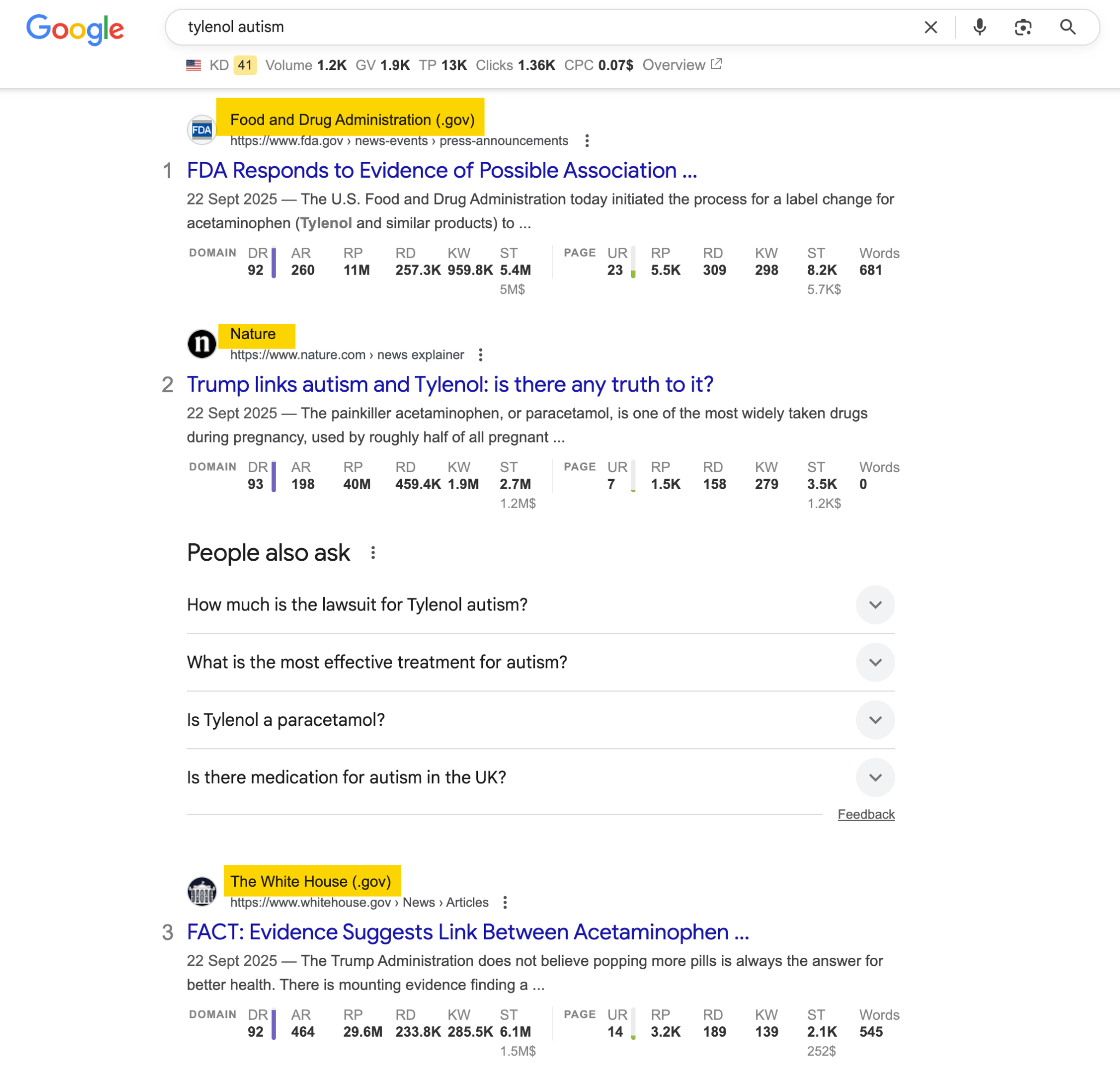
Google looks at experience, expertise, authority, and trustworthiness signals when judging content. Content that shows credibility not only ranks higher but also builds user trust, keeping people engaged and coming back. And while EEAT isn’t a direct ranking factor, it guides Google’s quality raters and influences how search results are shaped.
Lack of EEAT is thought to be why many health and life-related websites dropped like a stone in August 2018 when Google rolled out its now infamous “medic” update.
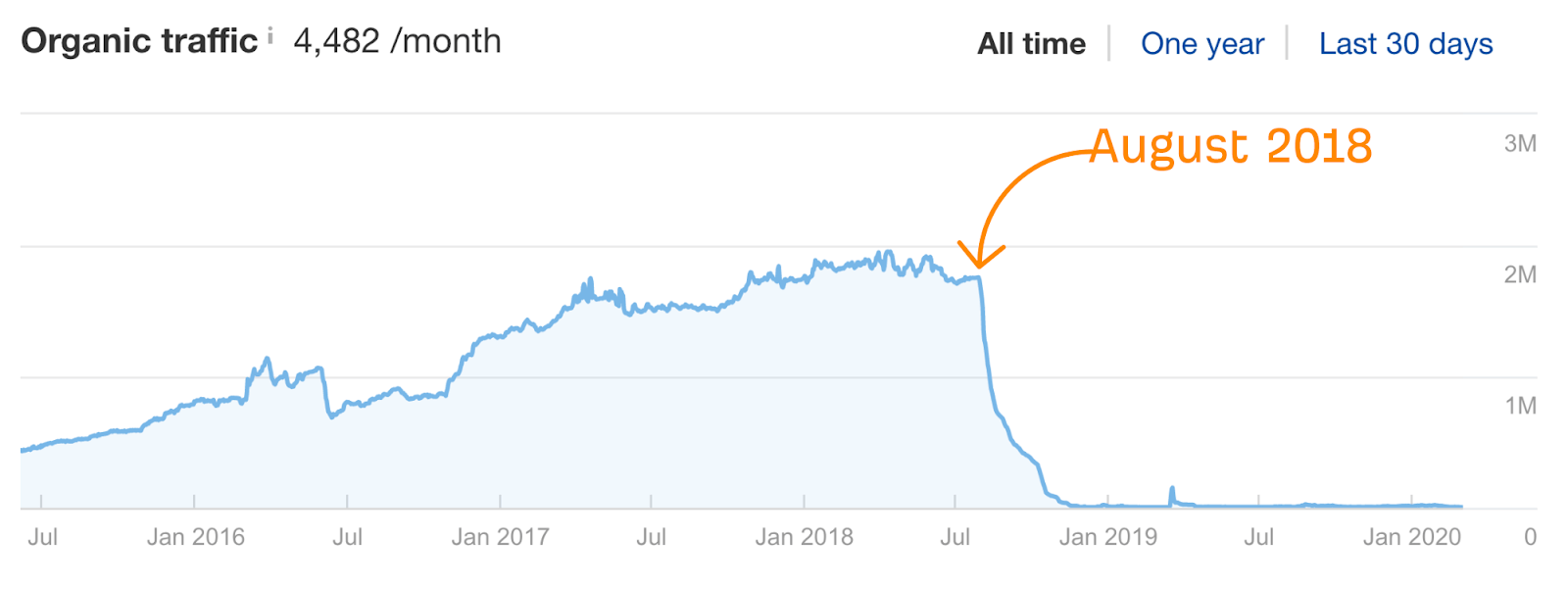
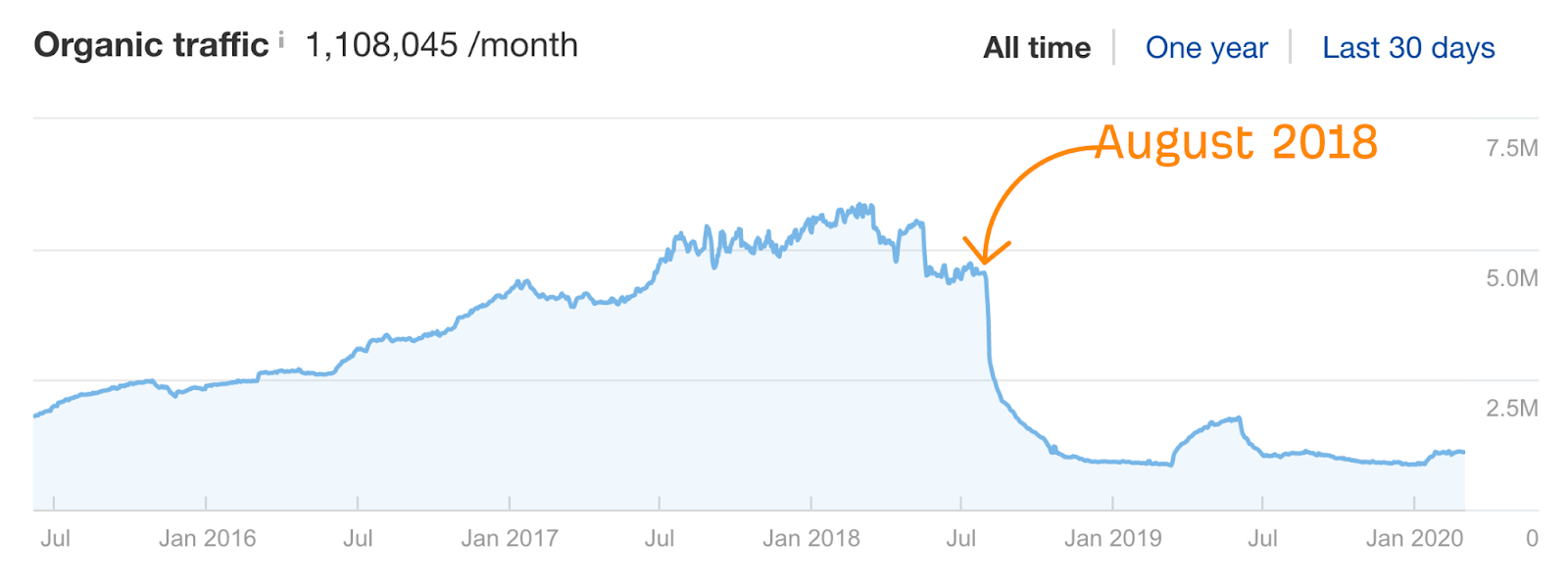
Because many of these sites had almost no EEAT in the first place, traffic dropped when the core update rolled out, and Google’s ability to algorithmically detect EEAT improved.
It’s quite clear that Google takes E-E-A-T seriously, so building it into your content is one of the best ways to grow and protect your visibility, especially for sensitive areas like health or finance, where trust really matters.
Let’s break down what Google really means by each piece of the EEAT framework.
Experience: the authenticity standard
Experience in EEAT is about the extent to which content creators demonstrate necessary first-hand, real-world involvement with their topic.
How to demonstrate experience:
- Share authentic stories, case studies, and lessons learned from mistakes or successes.
- Use original images, videos, or audio that show direct engagement.
- Share your personal experience with the subject on an “about” page and even link to your social media profiles if they provide additional evidence
The key idea is that firsthand experience makes a source more trustworthy. For example, Thomas Sanladerer keeps his credibility in the 3D printing space because he personally tests every printer he reviews and shows proof of it—something that can’t be replaced by secondhand knowledge.

For example, you can lead your content with a note about how it was created. A section like this is the perfect spot for demonstrating firsthand experience, just like Wirecutter has been practicing for years.

The fact that the author of the page needs to demonstrate experience doesn’t mean that the owner of the website has to. You can still demonstrate experience on topics where you don’t personally have it by inviting guest authors.
Expertise: demonstrating verifiable knowledge
Expertise refers to the creator’s level of skill and deep knowledge in their specific field.
How to demonstrate expertise:
- Detailed author credentials and biography pages.
- In-depth, comprehensive content that goes beyond surface-level summaries.
- Links to authoritative sources and original research to substantiate your claims (internal links matter, too).
- Cite experts in your content when appropriate.
- Organize content into topical clusters to show depth and consistency on key subjects.
Key distinctions:
- YMYL (Your Money or Your Life) topics require formal expertise (medical degrees for health advice, certified expertise for financial guidance).
- Non-YMYL topics can rely on “everyday expertise” gained through extensive practice and demonstrated knowledge.
Healthline is a strong example of expertise in action. Every article is fact-checked, many are reviewed by doctors, and they even keep a changelog to show when edits and updates are made.
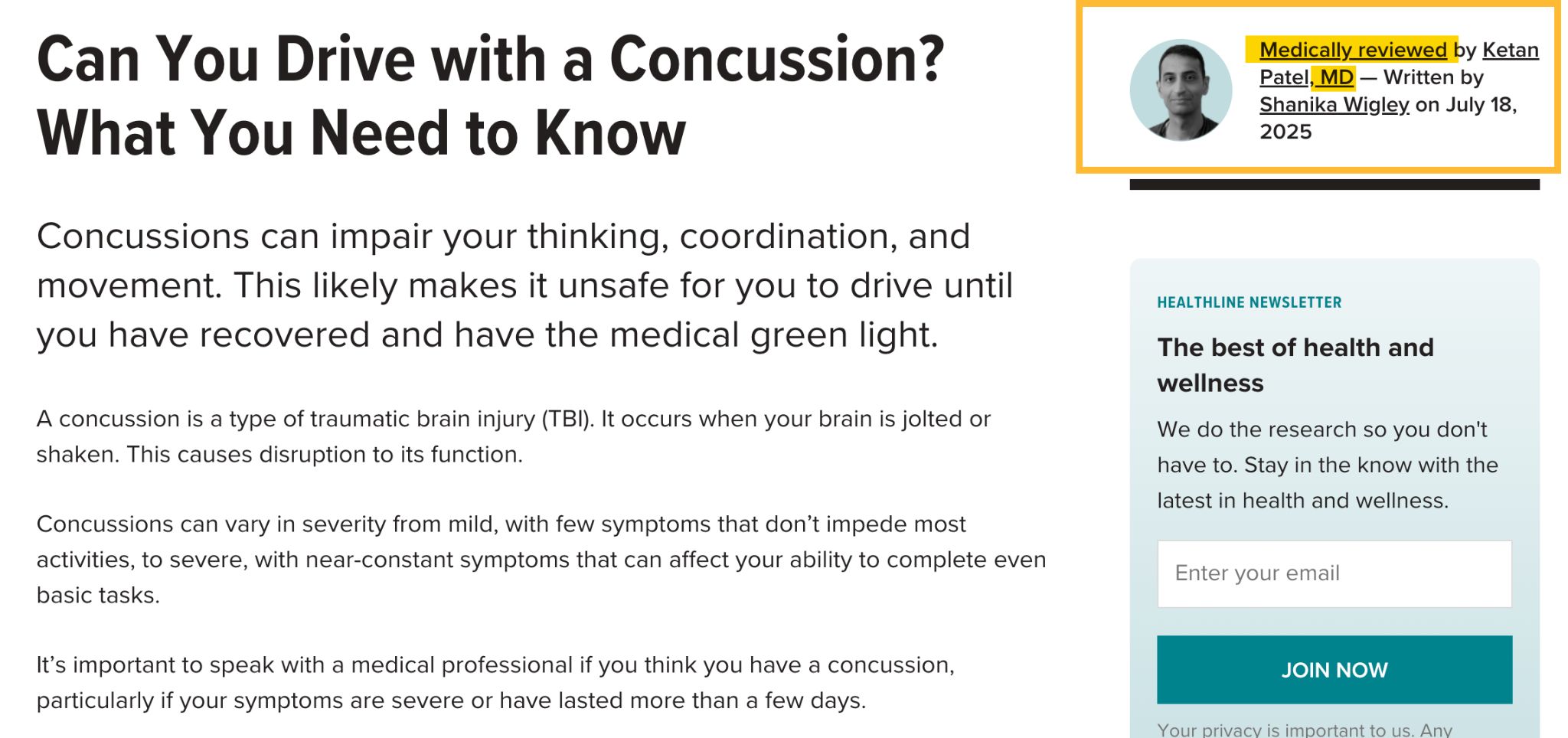
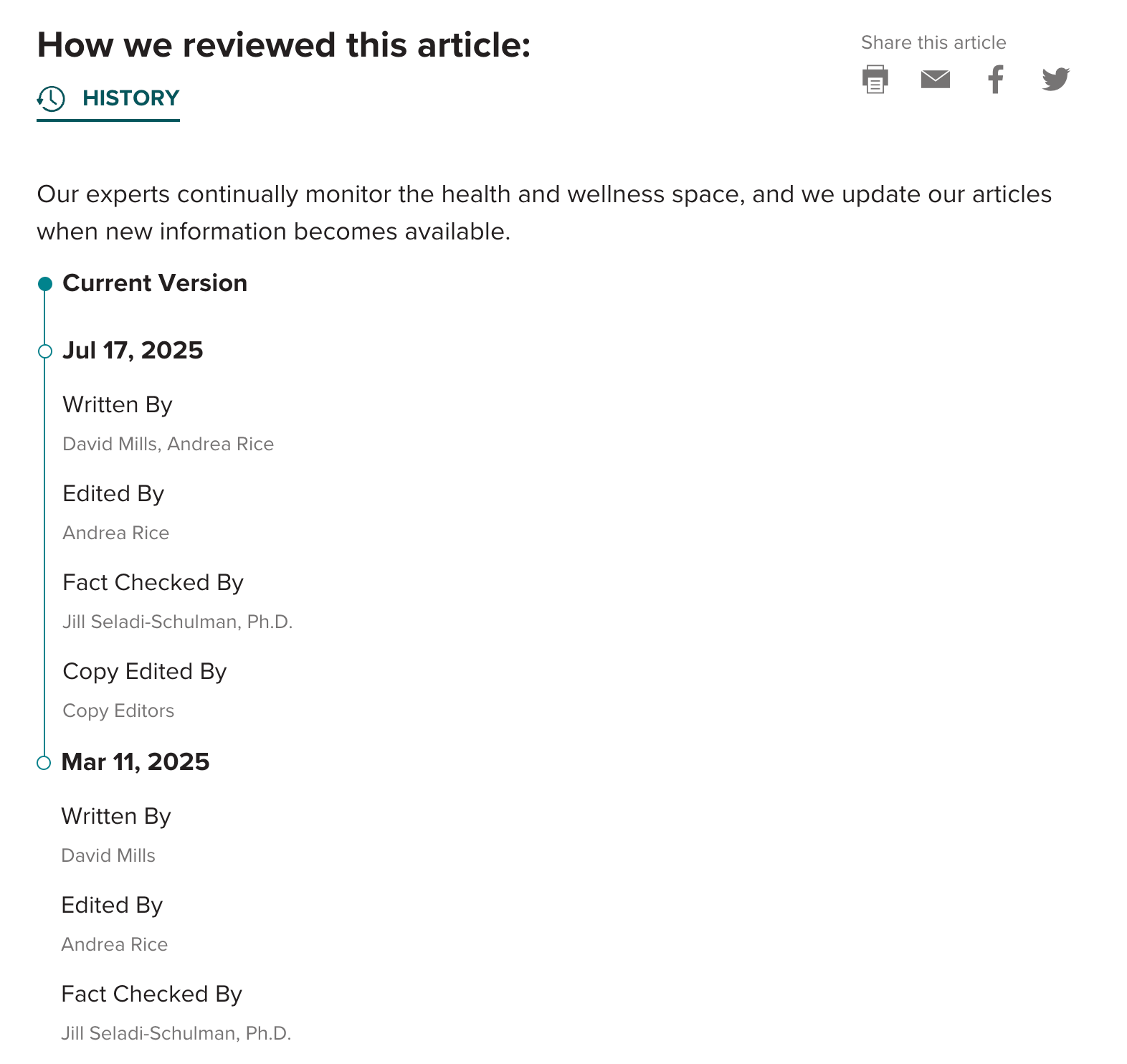
It’s worth noting the difference between experience and expertise. Expertise is about knowledge and skills. Naturally, to gain that, you also need experience. But:
- It doesn’t work the other way around. Experience alone doesn’t make you an expert.
- Experience doesn’t have to come from expertise.
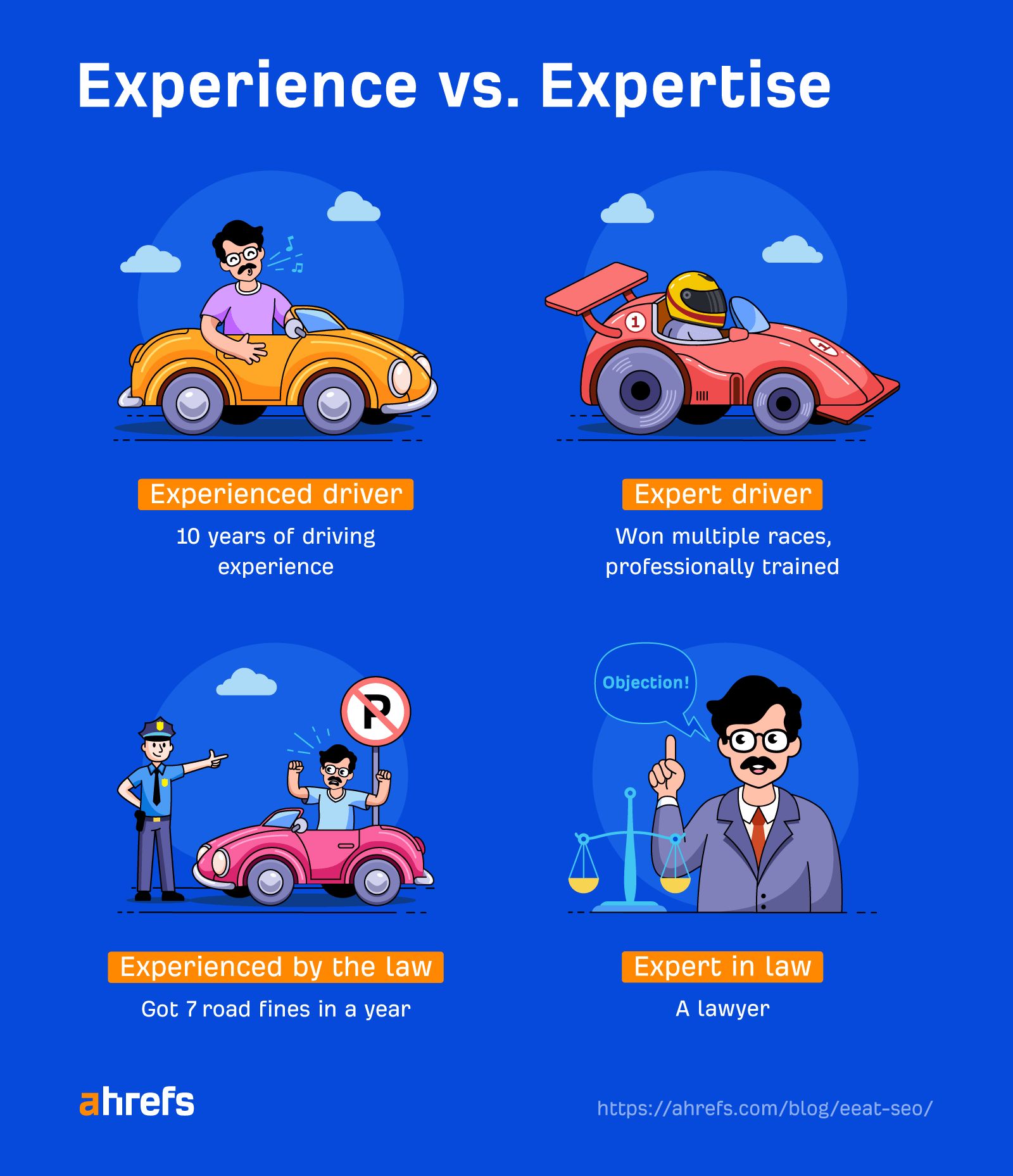
If personal experience is fundamental for establishing trust on the topic, the author doesn’t have to be an expert. A gardening enthusiast’s “everyday expertise” is valuable for plant care advice, but a medical professional’s formal expertise is non-negotiable for health topics.
Google provides a handy list of examples to better understand this nuance (QRG, page 28):
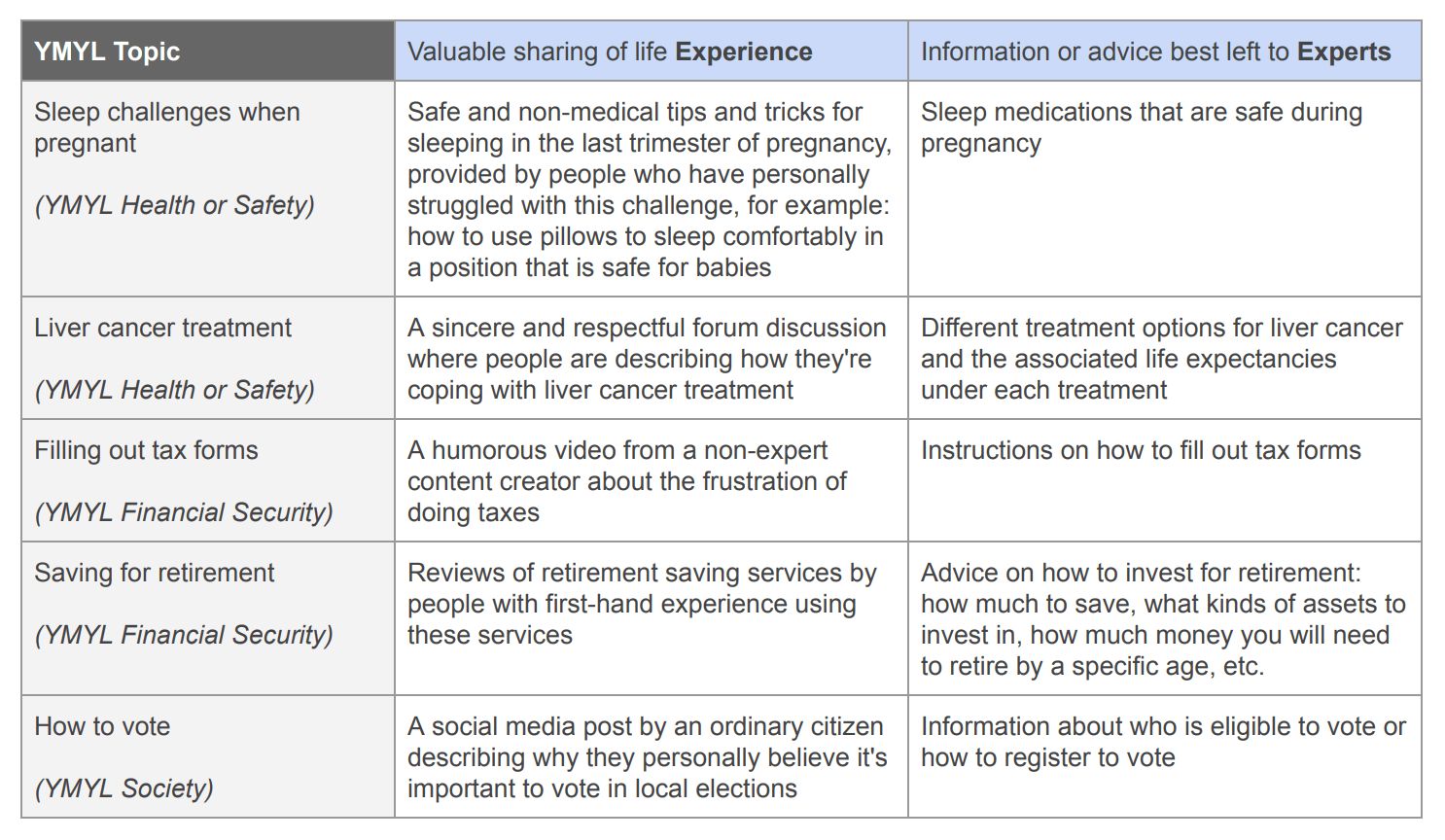
Authoritativeness: building industry reputation
Authoritativeness means being recognized by others as a trusted go-to source in your field or industry.
Authority is always relative—Tesla is an authority on electric vehicles, but not on SEO best practices.
The goal here is to get more quality backlinks and mentions from reputable sites. Here are a few ideas on how to achieve that:
- Get more positive online reviews.
- Share original insights, a unique perspective, or useful advice that highlight your expertise.
- Publish original research or data studies.
- Appear on webinars, podcasts, and interviews.
- Highlight your company’s achievements through PR.
For example, Ahrefs’ original data studies are often referenced across the web, even in answers from AI tools like ChatGPT. This shows how we’ve built a reputation as a trusted source for unique industry data.
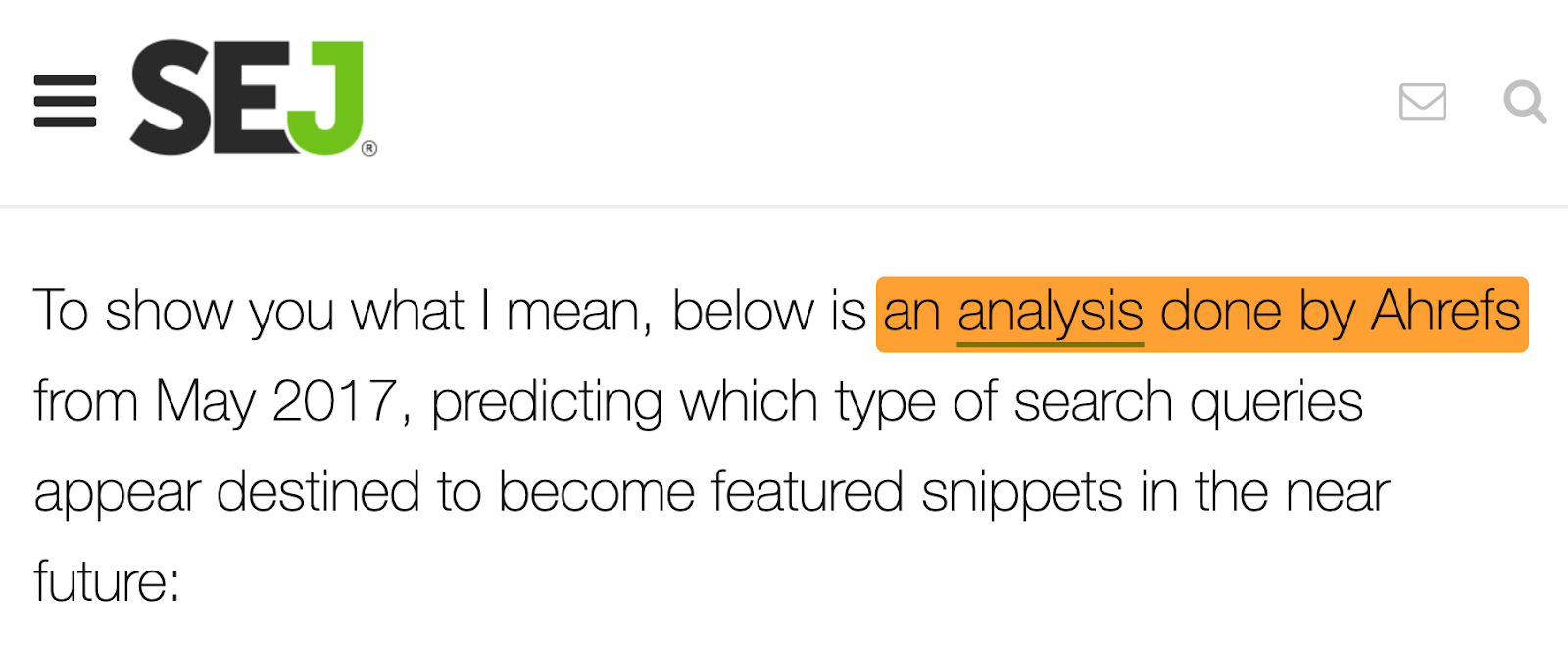
Another example is the website Best Wallet Hacks, which features an actual table of contents for press mentions. Imagine comparing that with a completely new blog on the same topic no one has heard about—which is more trustworthy?

Trust: the foundational pillar
Trust refers to the accuracy, honesty, safety, and reliability of a website and its content.
How to build trust:
- Clear “About Us” pages, accessible contact information, and transparent privacy policies.
- Fact-checked content, proper citations, and regular updates as needed for the topic.
- HTTPS encryption, secure payment processing.
- Clear disclosure of sponsored content, genuine customer reviews.
Trust is the most important component. A page deemed untrustworthy will have low EEAT regardless of how experienced, expert, or authoritative it appears.
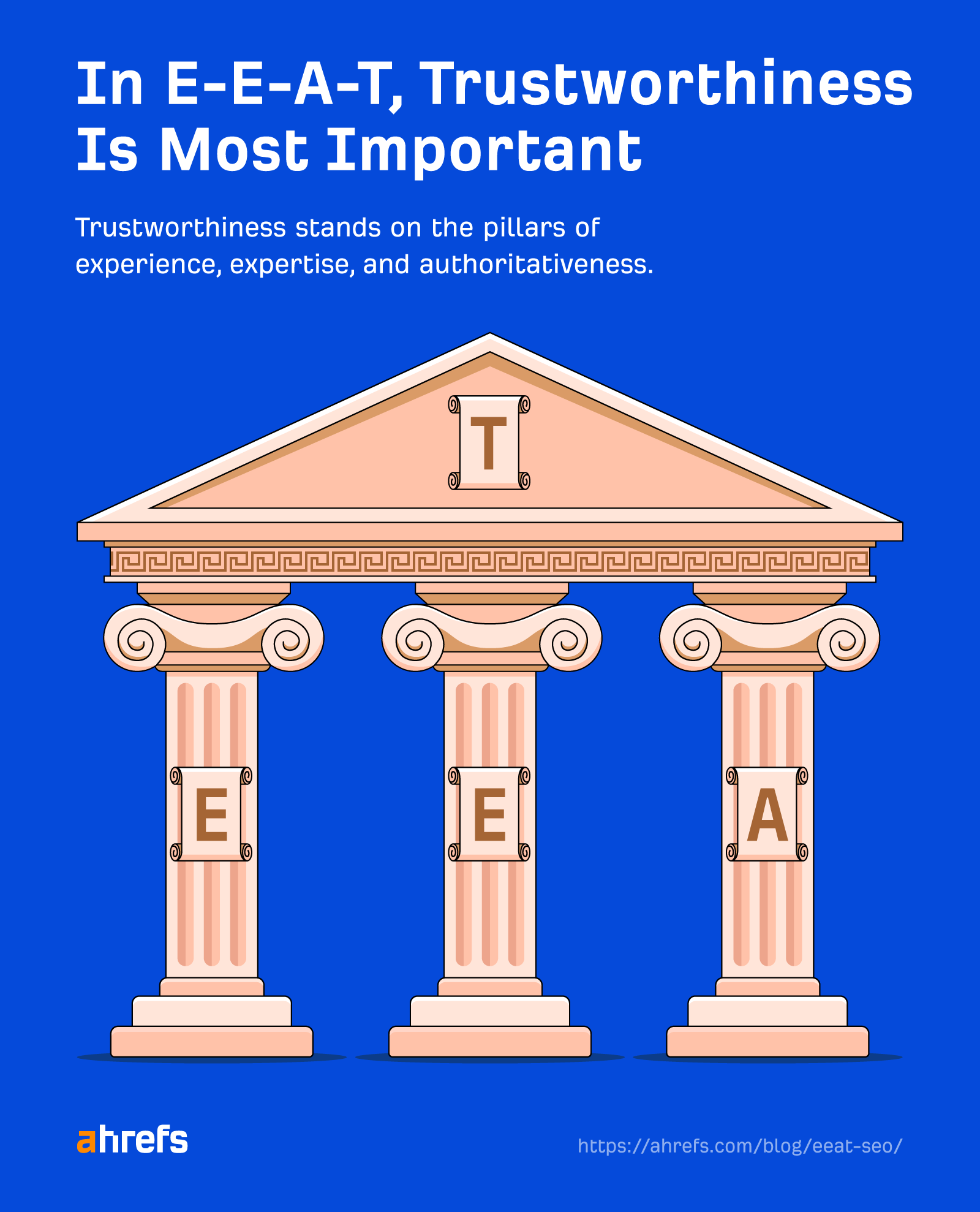
For example, citing reliable sources—or even better, backing up your claims with clear evidence—shows expertise, and that expertise builds trust over time.
Moreover, Google says content doesn’t need to demonstrate all elements of EEAT to be deemed trustworthy.

“Your Money or Your Life” topics receive heightened scrutiny because inaccurate information could significantly impact health, financial stability, safety, or happiness.
If a site covering these sensitive topics lacks EEAT, Google may even push it way down in the rankings.
YMYL categories include:
- Health and safety information.
- Financial advice and transactions.
- Civic and legal information.
- News and current events.
- Information about groups of people.
Readers (and Google) want to know who’s behind the content, where the information comes from, and that the site is transparent about its authors and organization. That’s why advice on sensitive topics—like health or money—should come from qualified professionals or, at the very least, be reviewed by certified experts.
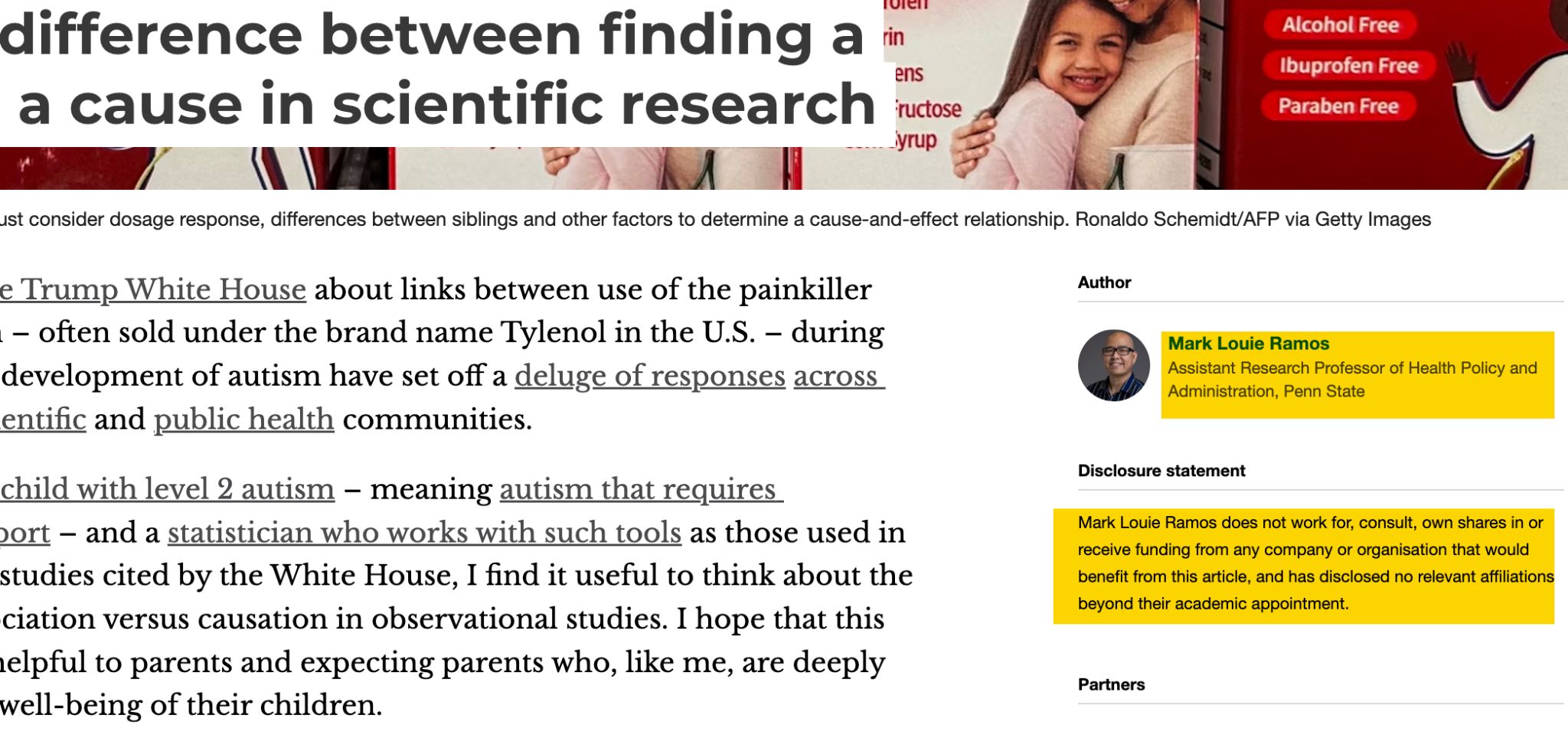
E-E-A-T began as a set of quality guidelines, but today it’s central to how content appears in both Google Search and AI-driven results. The March 2024 Core Update reinforced this by folding the Helpful Content System into Google’s main ranking algorithm, making E-E-A-T more influential than ever.

The HCS is essentially Google’s way of scaling EEAT. It uses algorithms to identify and reward content that truly embodies those qualities—content that’s useful, authentic, and written for people.
At the same time, HCS reduces the reach of content created primarily to deceive search engines. That includes mass-produced low-value content (also known as scaled content abuse) and low-quality content that exploits reputable sites’ authority (also known as site reputation abuse).
Last but not least, a lack of EEAT can hurt not just one page, but your entire site’s visibility. That’s why content pruning—removing or updating weak, outdated, or low-quality pages—can bring results. By cutting out content that doesn’t meet EEAT standards, you strengthen your site overall and make it easier for high-quality pages to rank.
E-E-A-T isn’t a direct ranking factor, but it indirectly influences rankings in a significant way. As ex-Google Search Liaison Danny Sullivan explained:
Is E-A-T a ranking factor? Not if you mean there’s some technical thing like with speed that we can measure directly. We do use a variety of signals as a proxy to tell if content seems to match E-A-T as humans would assess it. In that regard, yeah, it’s a ranking factor.” October 11, 2019
Google uses quality rater feedback to identify tangible signals that align with EEAT, then adjusts ranking algorithms accordingly. This means E-E-A-T influences rankings through various measurable proxies rather than as a direct score.
No, Google does not give your website an EEAT score, just as there was no EAT score originally.
EAT and YMYL are concepts introduced for Quality Raters to dumb down algorithm concepts. They are not ‘scores’ used by Google internally. #Pubcon @methode Followup: There is no EAT algorithm.— Grant Simmons (@simmonet) October 10, 2019
That said, there are still ways to improve your expertise, authoritativeness, and trust in the eyes of Quality Raters—I’ll provide a quick checklist at the end of the article.
Google doesn’t give sites an official E-E-A-T score, but there are a couple of useful metrics you can track as a proxy to gauge and improve it: backlinks and mentions.
As Google’s Gary Illyes confirmed, EEAT is “largely based on links and mentions on authoritative sites.”
I asked Gary about E-A-T. He said it’s largely based on links and mentions on authoritative sites. i.e. if the Washington post mentions you, that’s good. He recommended reading the sections in the QRG on E-A-T as it outlines things well.@methode #Pubcon
— Marie Haynes (@Marie_Haynes) February 21, 2018
Backlinks as a proxy for measuring EEAT
The “links” mentioned by Gary Illyes are, of course, backlinks, hyperlinks from one website to another. And based on what we’ve established about the quality of backlinks, the more links from unique, authoritative websites on relevant topics, the better.
You can easily track links from unique, authoritative domains by using the “quality links” filter in Ahrefs’ Site Explorer.
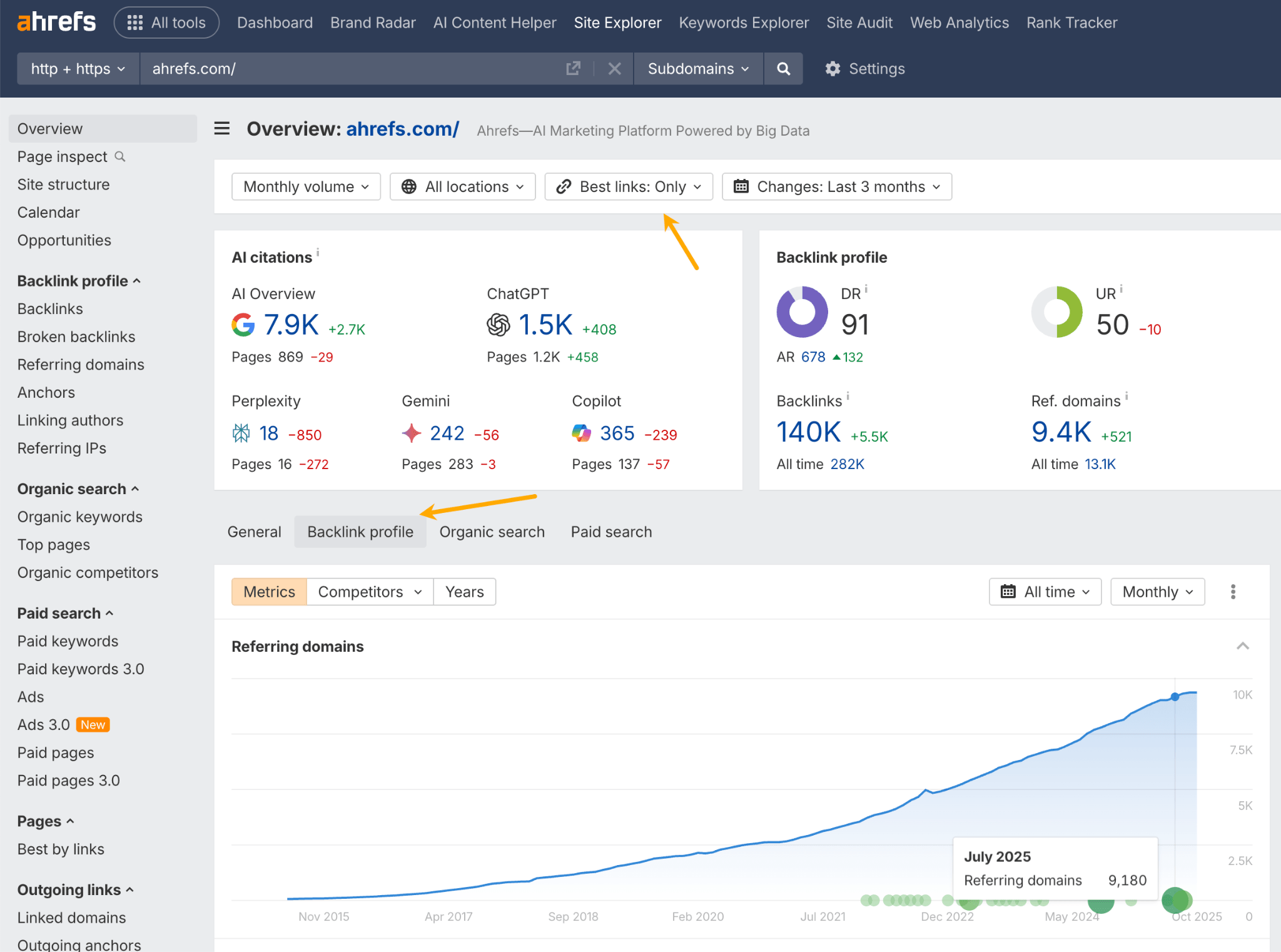
If you want to see which topics you’ve been mentioned for, go to the Backlinks report and type your chosen topic into the “anchor and surrounding text” field.
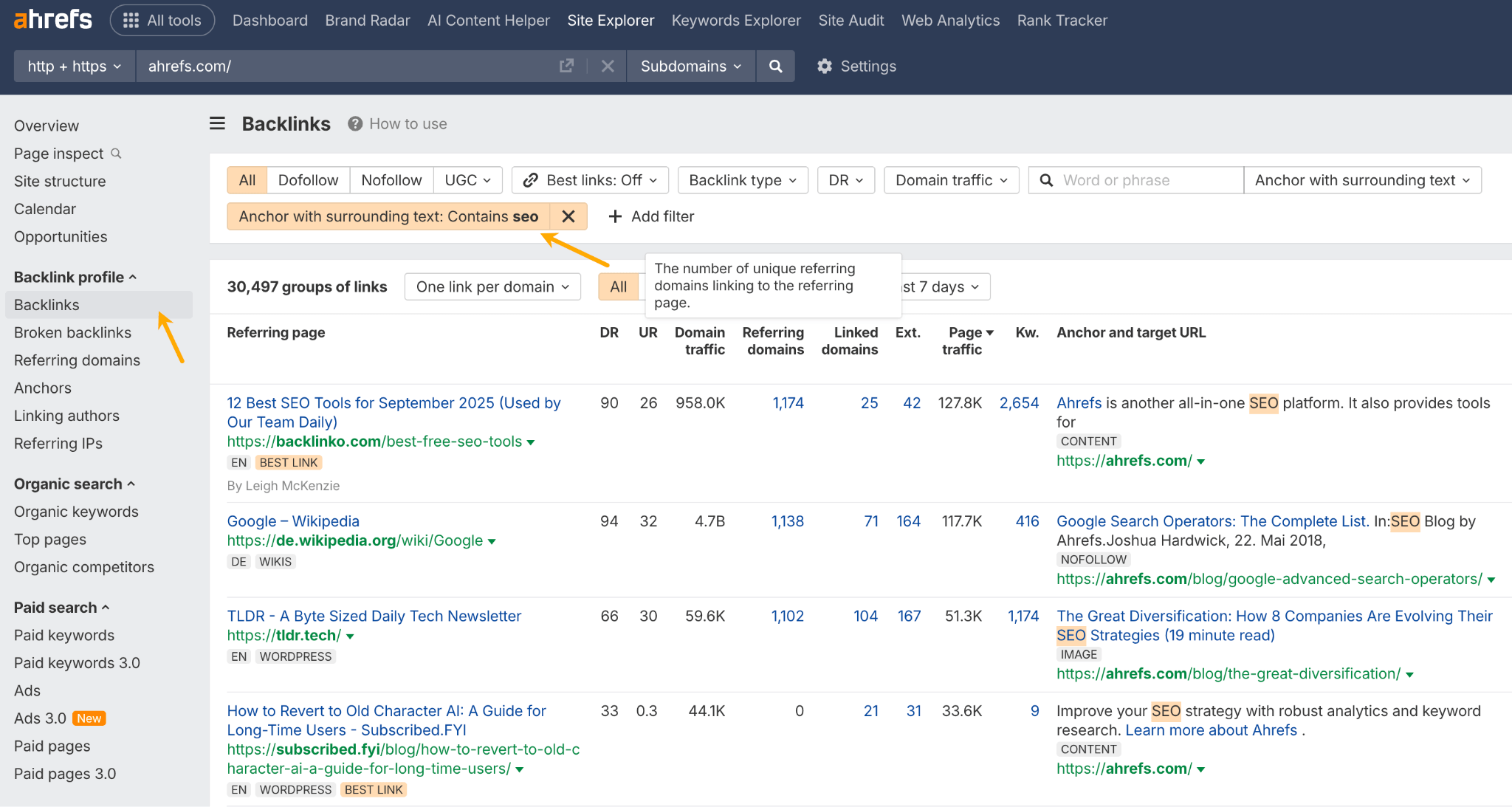
Keep in mind, these aren’t official metrics—there’s no such thing as a real E-E-A-T score. They’re just useful guidelines to help you gauge how trustworthy your site looks.
Mentions as a proxy for measuring EEAT
Based on Gary Illyes’ statement, mentions also matter.
To see how many sites mention your brand, search Google for “your brand” -site:yourdomain.com and click the Tools icon. The results show pages that mention your brand, and by repeating this each month, you can track whether those mentions are increasing.
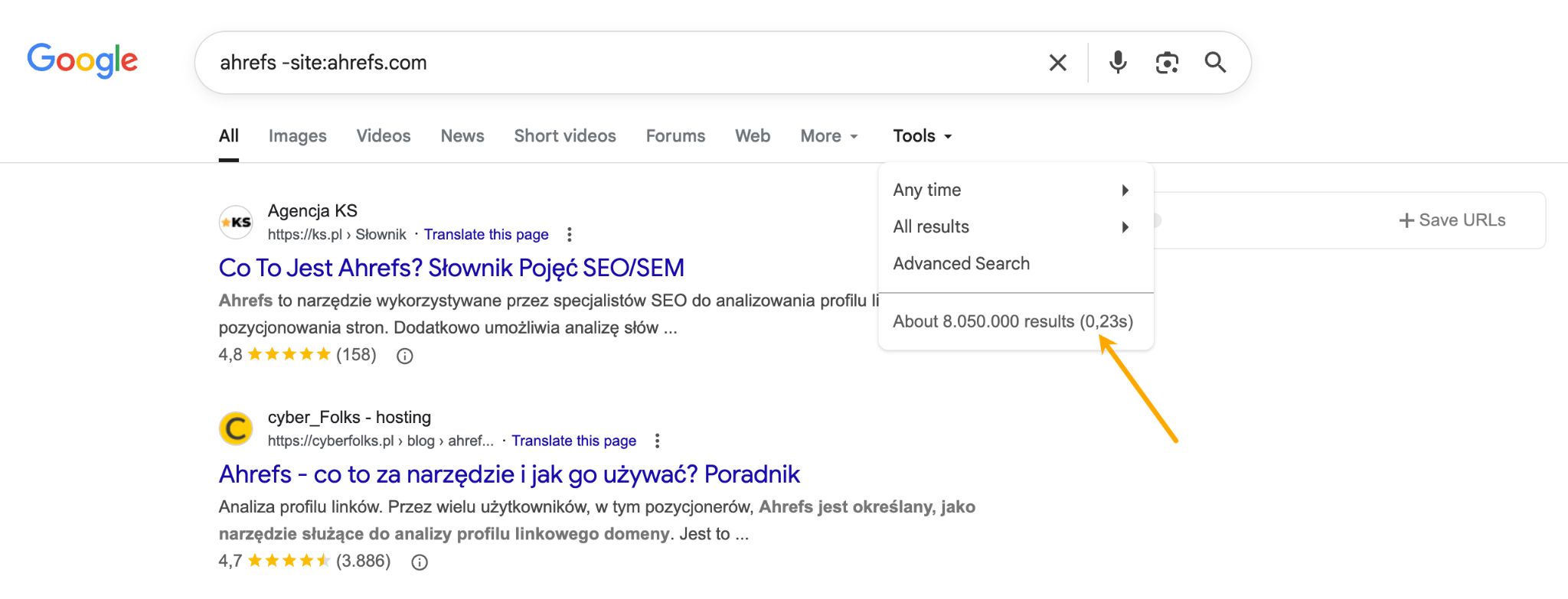
If you want to track this at scale, Ahrefs’ Brand Radar can help. You can filter brand mentions by metrics like Domain Rating (DR) or website traffic, which helps you zero in on mentions from more authoritative sites.
- Enter your brand.
- Go to the Web pages report.
- Set filters: -site:[your domain] in the blank input and set minimum DR (Domain Rating) to 40.
- Sort the results by traffic.
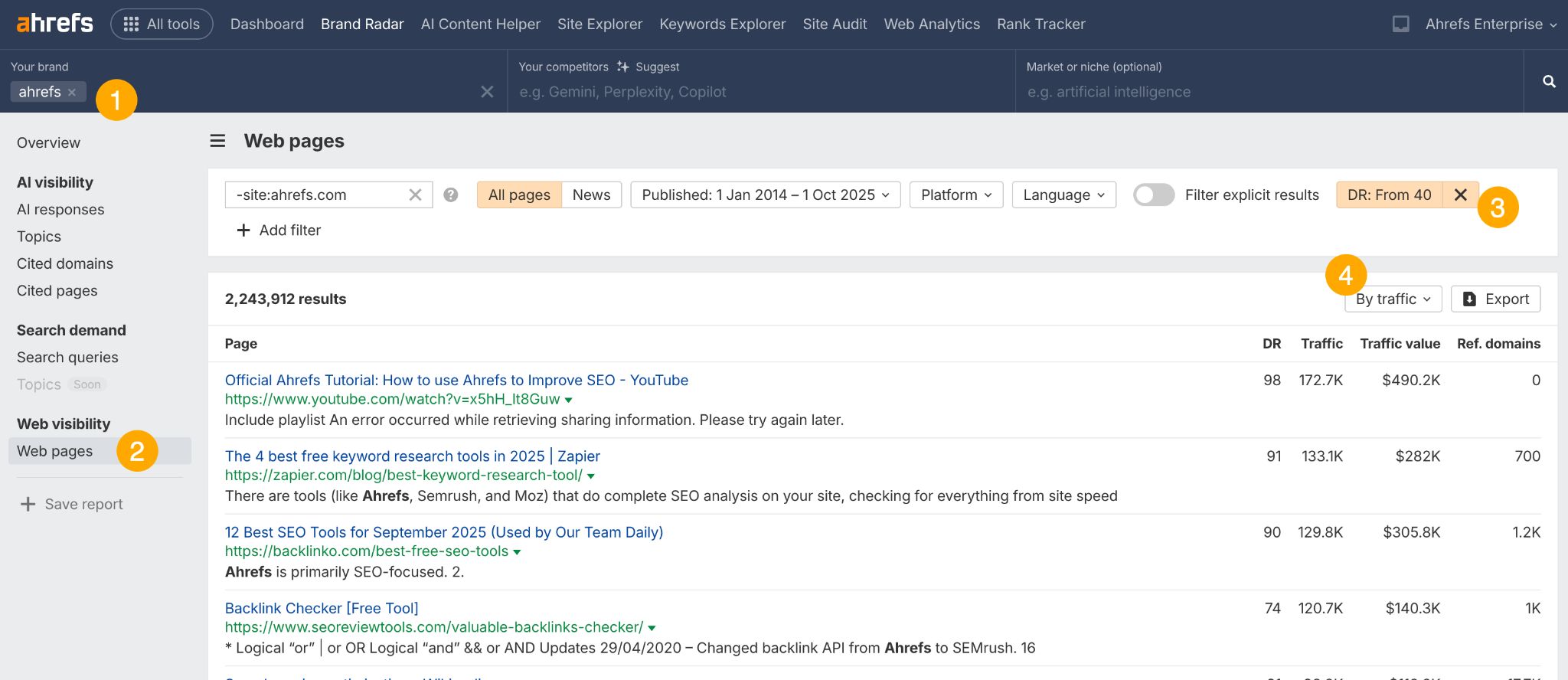
Google’s position on AI content remains consistent: they reward high-quality content regardless of how it’s produced.

Google doesn’t seem to be bluffing here. In one study, we found that 81.9% of the content ranking in the top 20 results includes some form of AI-generated material. If Google truly prioritized 100% human content, the results would likely reflect that much more strongly.
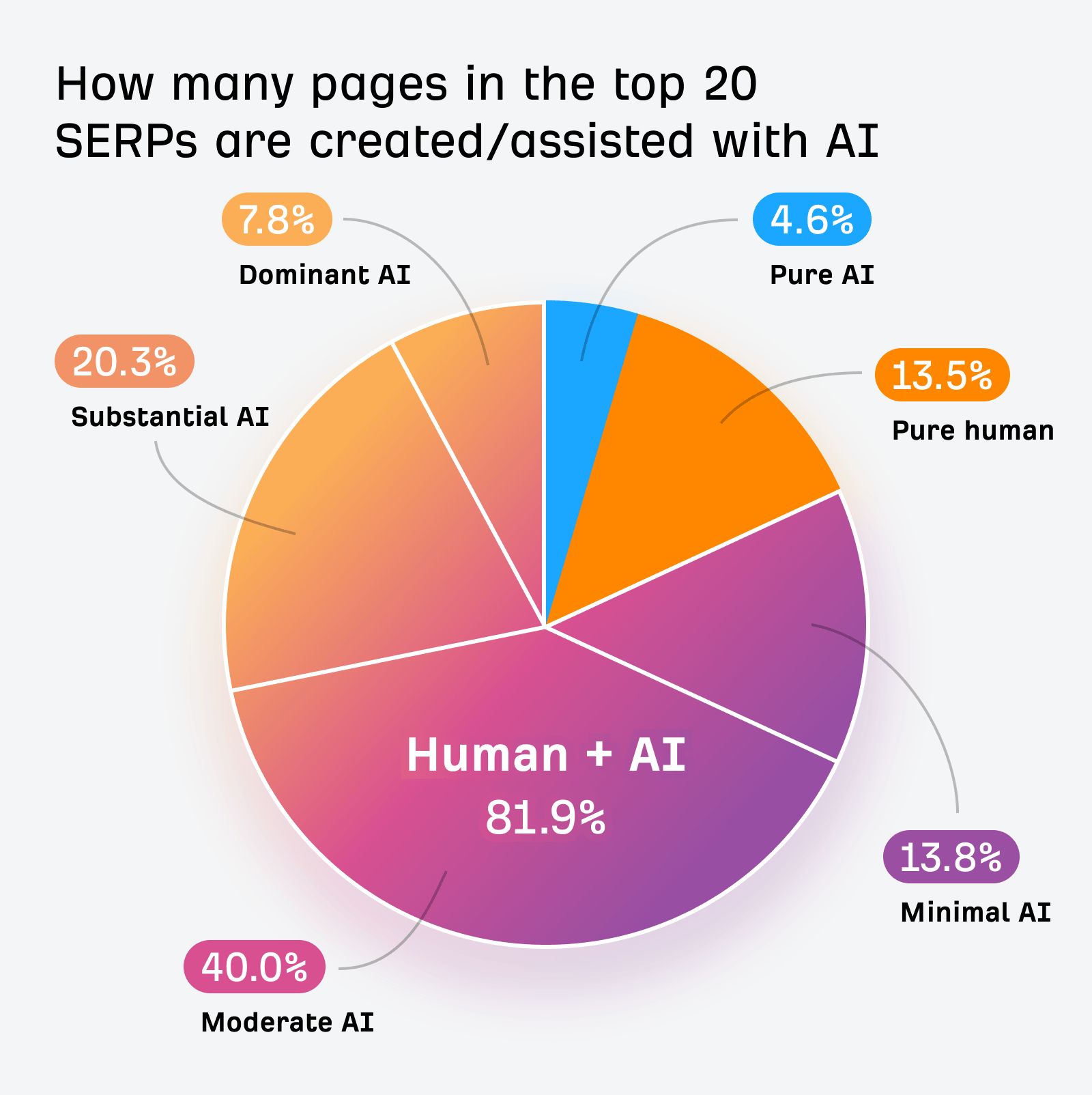
So, if you’re using AI to make content, be mindful of how you apply it to ensure the content still reflects expertise, experience, authority, and trust. My advice is to:
- Have a real person review every piece of content before publishing.
- Add genuine experience and personal insights that AI cannot replicate.
- Implement rigorous fact-checking to prevent AI hallucinations.
- Use Google’s self-assessment guide to align content with EEAT.
Most likely, yes. AI Overviews and AI Mode just seem to be new ways of showing content that’s ranked using the same principles.
There’s also strong evidence that E-E-A-T principles are built into how Google decides which sources to cite in AI-generated answers.
Our research shows that 76% of AI Overview citations come from the top 10 search results, suggesting AI answers inherit traditional E-E-A-T signals (source).
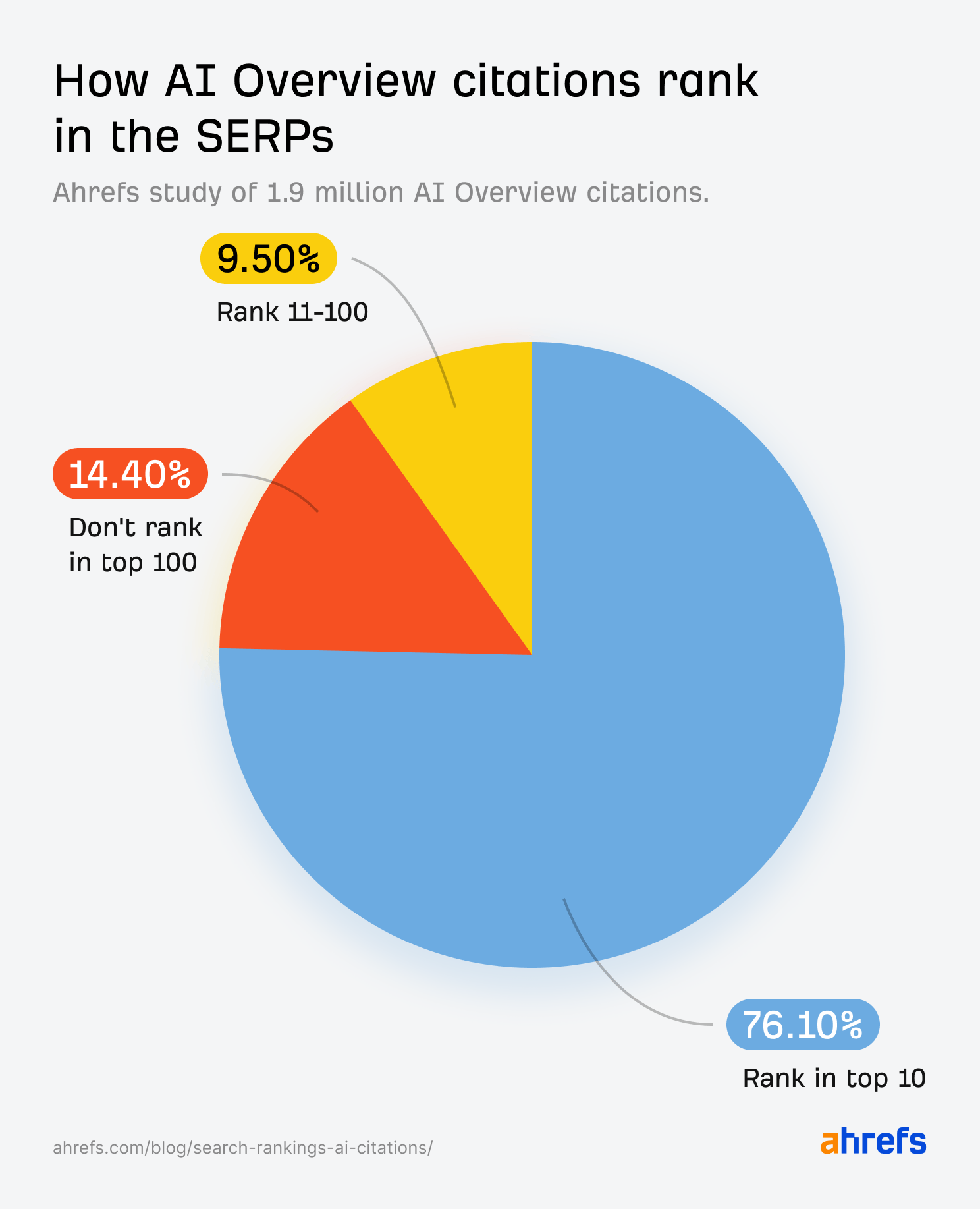
More tellingly, the strongest correlations with AI Overview mentions are all off-site authority signals: branded web mentions (0.664 correlation), branded anchors (0.527 correlation), and branded search volume (0.392 correlation) (source). In other words, well-known and trusted brands are more likely to stand out and perform better in AI-driven search results.
Not exactly. EEAT is a Google-specific framework, so AI assistants like ChatGPT, Claude, or Perplexity don’t literally “use” it, though Gemini might be an exception since it’s Google’s own product.
That said, AI assistants do have their own ways of evaluating trustworthiness:
- Retrieval-augmented generation (RAG). When they need a more accurate answer, assistants search the web in real time. If they pull from Google, chances are the results already reflect Google’s EEAT standards. If they pull from Bing, the results go through Bing’s equivalent system, called Content Quality.
- Built-in trust filters. Beyond search, large language models apply their own internal checks to decide which sources are trustworthy and relevant enough to include in a response. This may not be as well-documented as EEAT, but you can test it directly by asking the assistants. In practice, the standards they apply end up looking quite similar to EEAT principles.
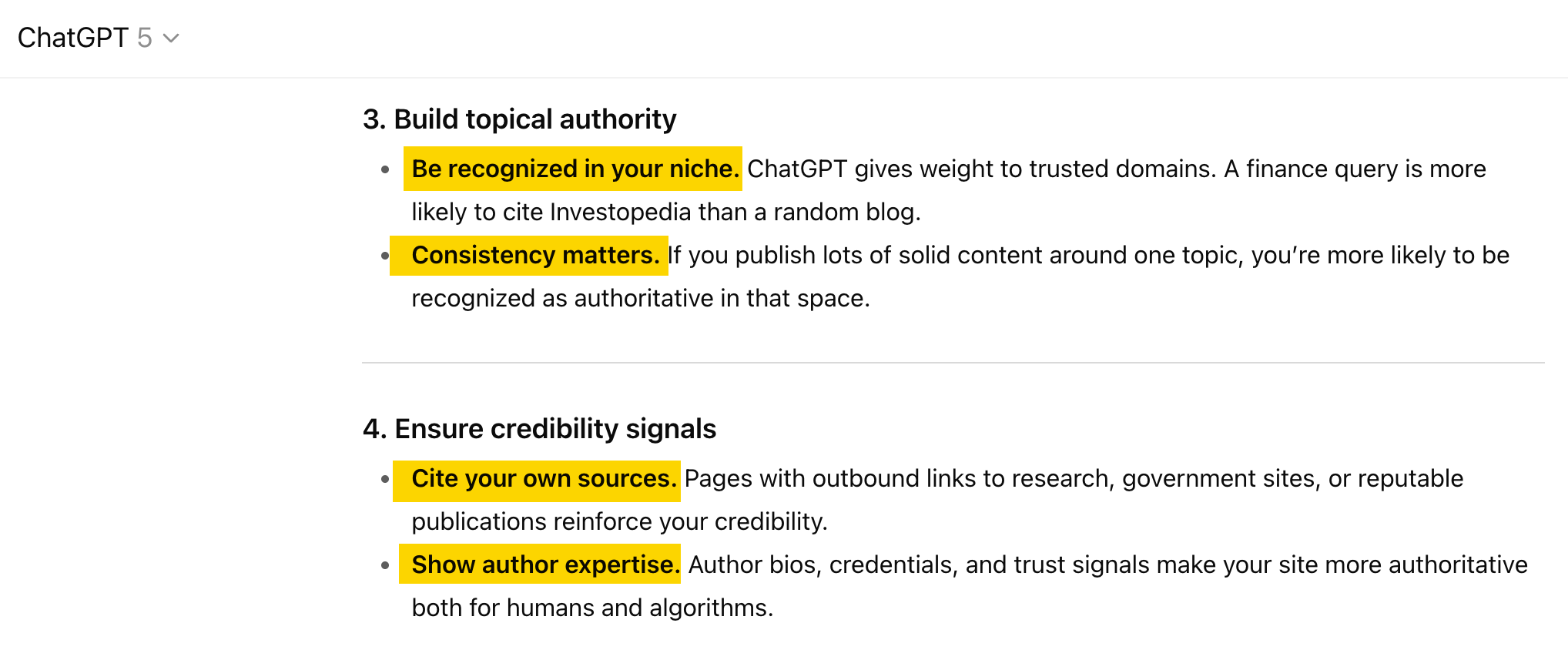
So while AI assistants don’t explicitly apply EEAT, the content that gets surfaced often aligns with EEAT principles—because it has already passed through search engine quality filters or the model’s own trust mechanisms.
| One-off tasks | Ongoing jobs |
|---|---|
| Link all key legal and policy pages (privacy, terms, returns, etc.) in your footer. | Refresh key YMYL pages every few months (use an editorial calendar to track updates). |
| Include clear company info (address, phone, email) so users can easily identify and contact you. | Regularly audit thin or outdated pages—improve them or remove them (see content pruning guide). |
| Ensure your entire site is protected with SSL encryption (HTTPS). | Add firsthand proof: personal stories, case studies, or original research. |
| Add disclosure statements for any affiliate or sponsored content. | Back up claims with authoritative sources, expert quotes, or your own data. |
| Use schema markup on key pages to help search engines understand your content. | Earn and showcase mentions from trusted publications and partners. |
| Publish an editorial standards page that explains your fact-checking and corrections process. | Build quality backlinks via PR, original research, guest posts, and journalist quotes. |
| Have important YMYL pages reviewed by an expert and credit them on the page. | Avoid intrusive ads and review ad placements periodically. |
| Link author bios to their LinkedIn or professional profiles. | Keep growing and interlinking topical clusters to deepen authority. |
| Showcase awards, certifications, or media mentions with an “As seen in…” section. | Appear on podcasts, webinars, or interviews. |
| Avoid popups that cover content, auto-playing videos with sound, or misleading ad placements. Keep ads clearly labeled. | Highlight achievements, awards, press mentions, and reviews. |
The changes may need some time to take effect. According to one of the leading experts on EEAT, Lily Ray:
Google often doesn’t do major reassessments of the overall site quality until the next core update rolls out – so any work that was done to improve E-A-T might take at least several months to be reassessed.
Final thoughts
Just like in real life, your website is judged by what you share. A good test for improving EEAT is to ask: “Why should someone trust this content, the author, and the site?”. If you can’t answer that easily, your site may come across as less trustworthy.
EEAT is more of an ongoing commitment to being the most trustworthy, knowledgeable source in your field rather than a destination you reach once. There are no shortcuts, no quick fixes, and no “hacks” that will suddenly boost your E-E-A-T overnight.
What works is consistency: regularly publishing expert content, maintaining transparent communication with your audience, earning recognition, and proving your experience through authentic storytelling. These activities compound over time, creating an unshakeable foundation of digital authority.
Got questions or comments? Let me know on LinkedIn.


